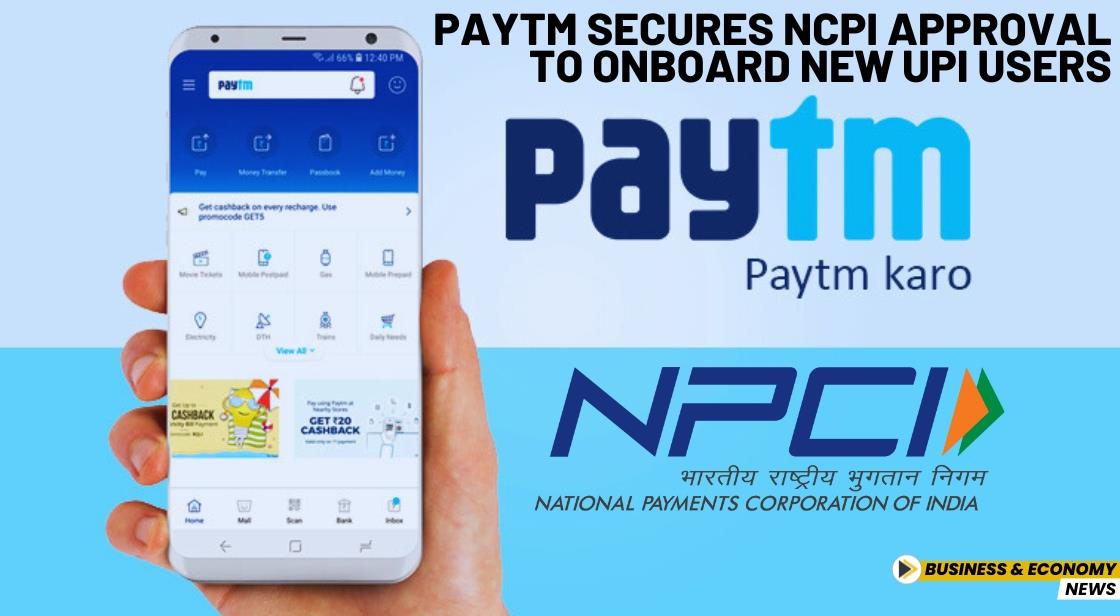Paytm Secures NCPI Approval to Onboard New UPI Users

News Synopsis
In a significant development for Paytm, the National Payments Corporation of India (NPCI) has granted the fintech giant permission to onboard new Unified Payments Interface (UPI) users. This decision comes as a relief for the company, which has faced restrictions in this area in recent months. The approval was announced in a formal communication from NPCI, confirming that Paytm must comply with various procedural guidelines and circulars to proceed with onboarding.
Details of the NPCI Approval
On October 22, 2024, Paytm released a statement through a late-evening filing with the Bombay Stock Exchange (BSE), informing stakeholders about the NPCI's decision. The company indicated that it received an official letter from NPCI granting permission for onboarding new UPI users. This approval, however, is contingent upon the company adhering to a comprehensive set of NPCI procedural guidelines and circulars, which have been issued over time.
Compliance with NPCI Guidelines
The approval is not unconditional. Paytm must ensure compliance with all guidelines outlined by NPCI, which include crucial aspects such as risk management, branding protocols for their application and Quick Response (QR) codes, multi-bank operational guidelines, market share limitations for Third Party Application Providers (TPAP), and regulations concerning customer data protection.
Specifically, the NPCI letter emphasized that Paytm's operations must align with the tri-partite agreement established between NPCI, Paytm, and the Payments Service Providers (PSP) Banks. This agreement is designed to ensure a structured and secure environment for all parties involved in UPI transactions.
Legal and Regulatory Compliance
In addition to adhering to NPCI's guidelines, Paytm is required to comply with all relevant laws and regulatory frameworks. The NPCI letter specifically mentions several key legal documents that the company must observe, including:
-
Payments and Settlement Act, 2007: This act governs the framework for payment systems in India, establishing the necessary regulations for payment processing entities.
-
Information Technology Act, 2000: This act addresses various aspects of digital commerce and cyber law in India, laying down rules for electronic transactions and data protection.
-
Digital Personal Data Protection Act, 2023: This recent legislation governs the processing of personal data, emphasizing the importance of user privacy and data security.
-
Circular on Storage of Payment System Data, 2018: This guideline dictates how payment-related data should be stored and managed to ensure customer privacy and compliance with regulatory standards.
The adherence to these laws is essential for Paytm as it seeks to restore and expand its UPI user base in a competitive digital payments market.
Background Context: Previous Restrictions
The approval to onboard new users comes in the wake of previous restrictions imposed on Paytm's UPI operations. Earlier this year, the Reserve Bank of India (RBI) issued directives that halted Paytm's onboarding of new UPI users, citing compliance issues. Specifically, the RBI's directions dated January 31, 2024, and February 16, 2024, mandated that Paytm pause its user onboarding processes until all compliance concerns were addressed.
In a letter to NPCI dated August 1, 2024, Paytm formally requested the lifting of the onboarding suspension. This appeal was met with a thorough examination by NPCI, which ultimately led to the current approval.
Implications of the Approval
The decision by NPCI to allow Paytm to onboard new UPI users has several implications. For Paytm, this represents a critical opportunity to regain market share and expand its user base in the increasingly competitive digital payment landscape. UPI has become a cornerstone of digital transactions in India, and the ability to onboard new users is crucial for Paytm's growth strategy.
For the fintech sector as a whole, this approval highlights NPCI's role in regulating and ensuring the integrity of digital payment systems in India. The conditions attached to the approval reflect NPCI’s commitment to maintaining high standards of operational compliance among all UPI providers.
Moving Forward
As Paytm embarks on this renewed phase of onboarding new UPI users, it will need to implement robust compliance mechanisms to meet the stringent guidelines set forth by NPCI. This includes not only operational adjustments but also continuous monitoring to ensure adherence to all regulatory requirements.
The company is expected to enhance its offerings and user experience as it brings new users onto the platform. The focus will likely be on leveraging advanced technologies to improve transaction security and user satisfaction.
Conclusion
The NPCI's approval for Paytm to onboard new UPI users marks a pivotal moment for the company and the digital payments landscape in India. With the implementation of compliance measures and a renewed focus on user acquisition, Paytm aims to solidify its position as a leader in the fintech space. As the company navigates this new chapter, stakeholders will be keenly observing how it adapts to the evolving regulatory environment and capitalizes on the growing digital payments market.
You May Like









